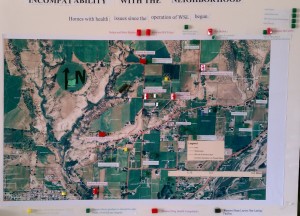Q. Is the Hostetler chicken facility on Powell Mesa causing any health issues?
A. CLUC and several physicians believe that a number of health issues are arising in the neighborhood, particularly downwind from this facility. Many neighbors are experiencing respiratory issues, rashes, and other problems that all appear to be directly related to the pollutants and toxic contaminants being discharged from this facility. This map lays out some of the residences where this is occurring.
Click on map to enlarge.
Q. The Hostetlers said there were no emissions from the chicken facilities out in western Illinois, but the Hostetler chicken facility on Powell Mesa is discharging lots of ‘stuff’ into the air. Why?
A. The answer lies in our climate differences. Western Illinois has an average humidity of 70% and their summer high temperature averages 82 degrees. Our average humidity is 15-30%, with frequent dips into the single digits during the summer. Our summer high temperature averages 93 degrees. In Illinois, manure (feces and urine) and litter on the floor of their facilities never fully dries because the humidity is so high and the temperature cooler, so the manure and litter is being constantly compacted onto the floor as the chickens (cage free) walk over it. Here, the manure and litter dries quickly and thoroughly because of our lower humidity and hotter temperatures. Instead of the manure and litter being compacted as the chickens walk over it, it is so dry that it is simply being pulverized into dust and being discharged into the surrounding air by the facilities “computerized tunnel ventilation” system. The ‘stuff’ being discharged can be carried for miles with the air currents. No neighbors are safe from it.
Q. Why did the BoCC approve these things so close to other homes?
A. We’re not sure. We believe the BoCC was ideologically and agenda driven to approve these things for this group of applicants, even at the expense, health, safety, and welfare of the neighbors. 25 – 30 of these facilities are home-based in Illinois, so during the hearings, we advocated for the Illinois Dept. of Ag setback requirements (1/4 mile from the nearest occupied residence for this type of facility), which would have disqualified both applications at their current locations here. However, Joseph Kropf, head of Fairfield Specialty Eggs, Inc., in Illinois, provided clearly misleading information to the BoCC at the Aug 15, 2011, hearing about their setback requirements in Illinois, and our BoCC bought into his untruthful testimony. Evidence was provided to the BoCC that clearly proved Kropf had misled them, but it fell on deaf ears. Kropf claimed his facilities were considered pastured operations in Illinois, and have no setback requirements. That was a blatant mistruth. First, Kropf’s facilities in Illinois are non-compliant because he never applied to the Illinois Dept. of Ag for approval to construct any of them. He simply ignored the statute that requires approval to construct. As a result, his facilities could never have been considered for a waiver of setback requirements as a pastured operation. Kropf has never been issued a “letter of exemption as a pastured operation” from the Illinois Dept. of Ag. During the hearings, we pleaded for even greater setbacks than required in Illinois because of our climate differences. Unfortunately, the BoCC chose to disregard our arguments. Commissioner Atchley asked several questions to Kropf concerning his setback requirements, so we know the BoCC was influenced by Kropf’s misleading statements. CLUC now knows that setbacks of at least 1/2 mile should be required for these facilities in our county..

